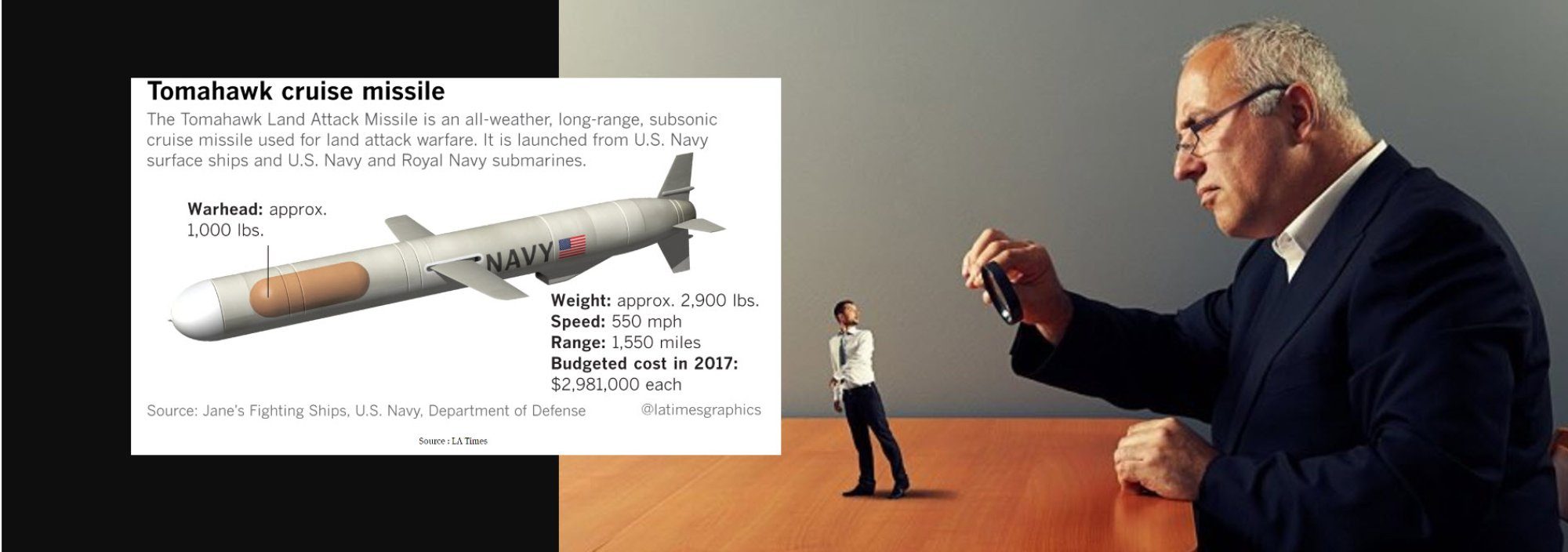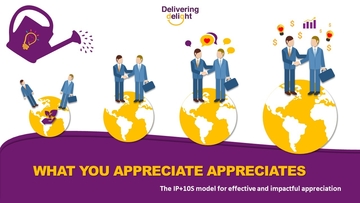Be A Tomahawk – The Antidote to #Micromanagement

“If your boss micromanages you and delegates to others, chances are that you did not earn the trust yet. It is likely that your boss is anxious when it comes to assessing your capability.” ~ Avi Liran
You can indulge in self-pity, complain about your boss, blame, and shame yourself and/or others. But before you resolve into disengagement, depression or resignation, perhaps you should check if you can upgrade yourself to become a Tomahawk.
In contrast to unguided ballistic missiles/rockets which follow a deterministic ballistic trajectory governed by speed, angle, gravity and air resistance, cruise missiles are designed to travel over super long distances with high precision at high subsonic speeds and navigate to the hit the target.
“Close enough is no longer good enough on today’s battlefield. Hitting the enemy—and only the enemy—has become critical to keep alliances together, maintain public support and manage the cost of battle.” ~ Raytheon.
The Tomahawk missile is a highly accurate, GPS-enabled precision weapon. Two-way satellite data-link enables it to be re-targeted in-flight to pre-programmed, alternate targets and to lock on a moving target.
Why should you brand yourself as a “Tomahawk”?
- $: Tomahawks are relatively rare and therefore they get a better pay and faster promotions. Your internal and external market value as a professional will hike.
- Influence: You will increase your influence base. You will have more choices to move internally to teams and tasks that you prefer. You will become more popular and have more friends. Everyone loves to have a humble Tomahawk who deliver results on his or her team.
- Proven: Acting consistently as a Tomahawk will increase your trustability. You will enjoy more freedom and autonomy to express your unique value. You will be given more fulfilling, interesting and complex projects that require larger teams and have higher budgets to work on.
10 steps to become a “Corporate Tomahawk”
- Delivering: You get things done. On time. Consistently. When people give you a mission they know that once you accepted a task they can “Launch and forget.” They trust that no matter what, you will hit the target. Unlike a nonguided missile, a Tomahawk is never lazy. It is constantly working until it reaches its target.
- Ownership: You own the task. You and no one else is responsible. You make sure that the task gets done. You have an internal checklist to ensure that you are on track and on time. You are well prepared with answers not with excuses. You have the situation mapped. You are up to date and able to give a clear picture of the status of your task. You do not wait for criticism or last moment. If you can’t figure it up by yourself, you flag and escalate for help. You actively solicit for an experienced advice or needed resources. Once you master a task and you are free, actively ask for a new one with more challenges. (Be the Winning Horse)
- Accountability: You do things on time. You avoid leaving things to last moment. Tomahawks admit failure and mistakes ASAP so they have sufficient time to turn around and relock to the target.You take responsibility for your personal and team glitches. You correct them, re-teach them and take the bullets for them. You avoid blame and shame. As a leader, your team’s failure is your failure. Accountability is perceived as a strength and courage. Blame, shame and guilt are acts of a coward unworthy of leading.
- Resourcefulness: You find solutions instead of problems. You do not give up easily or banging your head into a brick wall. You are constantly looking for new ways and approaches that can help you get to your target and overcome obstacles. “If the door is locked, you go to the backdoor. If the back door is locked, you go through the window. If the window is locked, you climb down from the chimney” ~ Dr. Chana Zelizer. Most of the times, you will have to win without the ideal resources. As they say on the first day in the army: “This is what we have and with this, we MUST win!” ~ IDF
- Adaptability and Self-Correction: You are poised and in control when things do not go according to the plans. You do not lose your cool. You are fast and agile in adjusting your implementation of strategy according to the changes in the terrain and circumstances. When contingency plans fail, you improvise. You keep your eyes on the moving target and adjust your course to hit it. Build your skills along the way. Calibrate your navigation with your misses and near hits to increase your hit rate. Invest in upgrading your capabilities continuously.
- Gathering intelligence: You gather important information before launching. You use multiple sources, you triangulate and cross the information given to you. You are a fast learner. You figure out by yourself all the obvious things.You know where to get the information or whom to ask. You plan your course ahead of time and have contingency plans.
- Self-confidence: You know your worth. You do not need constant affirmation. The best compliment that you seek is to be given a more complex job to do that demands growth and learning.
- Communication: #Micromanagement is often triggered by the anxiety and fear of the boss that things will not be done on time. Transparency and open communication are crucial. Update your boss and team regularly on the status of the mission. Clarify in a concise manner where things are headed and ensure that you are aligned with your boss and team. If you need more resources, come up with good reasons, justification, alternatives, and ROI. In times of crisis, “You hold the bull by its horns”. You communicate the problem and what you are doing to resolve it as fast as possible. The other side of communication is the ability to seek feedback from co-workers, not just the boss. Approach mentors and coaches that can help you with their experiences and different perspectives.
- Be the Godfather, Delight via Contribution: The more complex the task is, the more people and resources are needed. Everyone needs help. The easiest way to build your influence and create supportive coalitions is to contribute to people along your journey. Invest in others. Care for them. Don’t just use people for your task. Find a way that you can nourish them and assist them with their tasks. Contribute to every person that works with you or for you.
- Be appreciative and grateful: Appreciation is like a boomerang. The more you give it and the less you need it, the more it comes back to you in terms of appreciation of your generosity and graciousness. Show respect and appreciation for the trust and contributions that are given to you by your boss, peers, and employees. Being in a grateful state of mind leaves little room for a sense of entitlement or arrogance.

About Avi Liran
Inspirer, writer, humourist and TEDx/IDEASx speaker, Avi Liran (CSP) believes that everyone is a Chief Delighting Officer.






